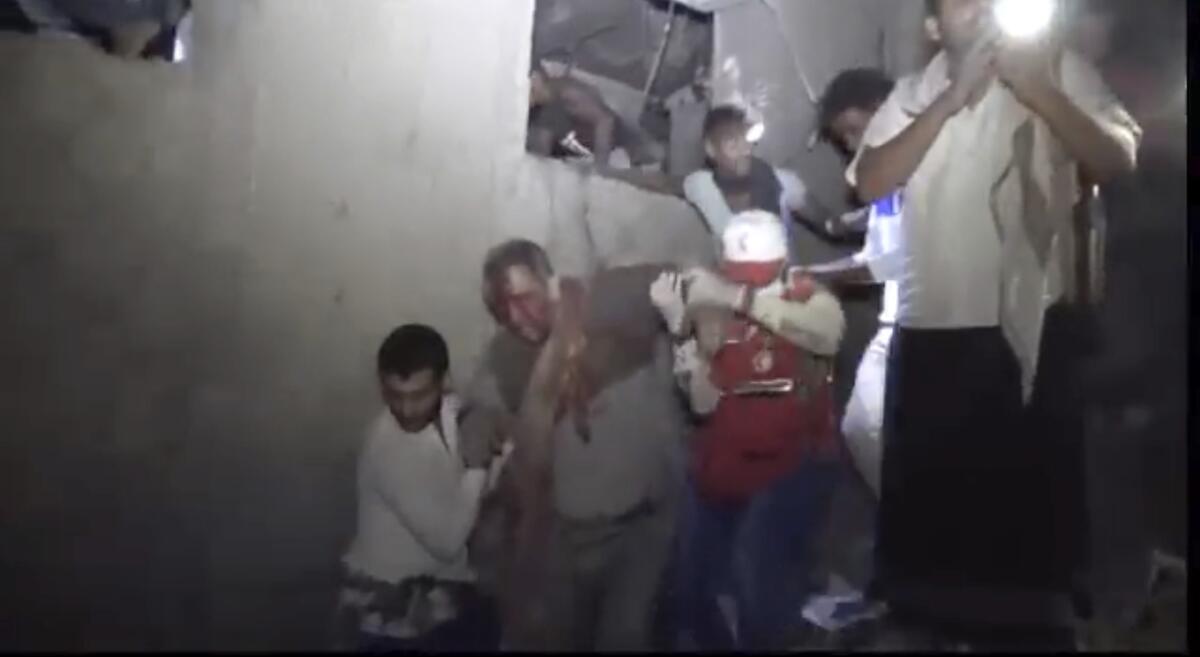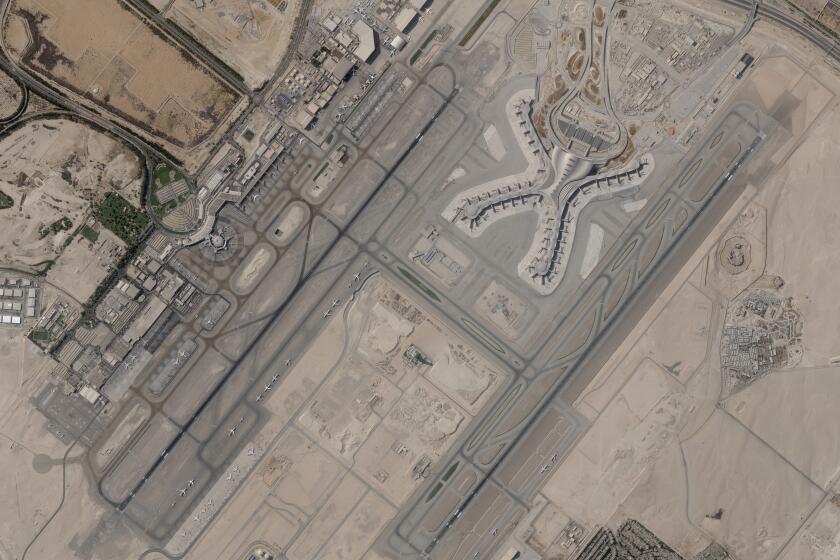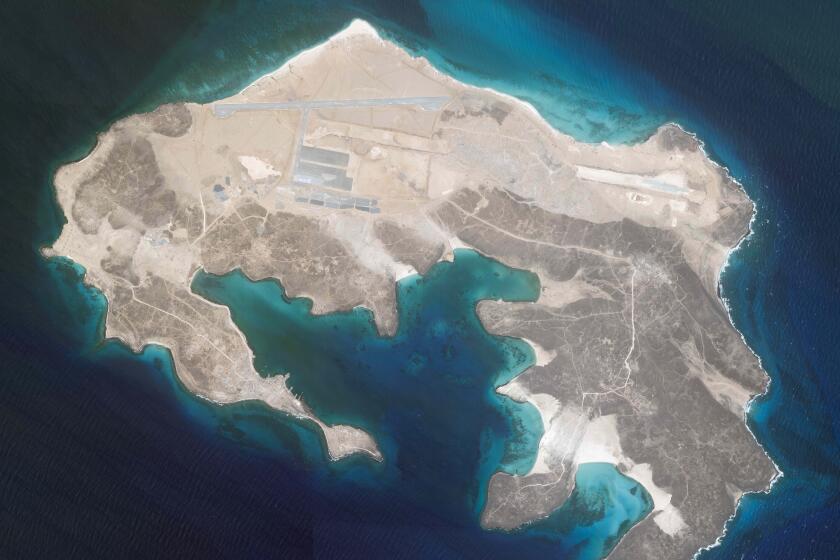Yemeni rebels say Saudi-led airstrike on prison killed 70

- Share via
SANAA, Yemen — A Saudi-led coalition airstrike hit a prison run by Yemen’s Houthi rebels Friday, killing at least 70 detainees and wounding dozens, a rebel minister said. The strike was part of a pounding aerial offensive that hours earlier knocked the Arab world’s poorest country off the internet.
The intense campaign comes after the Iran-backed Houthis claimed a drone and missile attack that struck inside the capital of the United Arab Emirates earlier in the week. It marked a major escalation in the conflict, a brutal civil war in Yemen where the Saudi-led coalition, backed by the UAE, has battled the rebels since 2015.
Taha Motawakel, health minister in the Houthi government, which controls the country’s north, told the Associated Press in the capital, Sanaa, that 70 detainees were killed at the prison but that he expects the number to rise in the coming hours since many of the wounded were seriously hurt.
Earlier Friday, a Saudi airstrike in the port city of Hodeida — later confirmed by satellite photos analyzed by the AP — hit a telecommunication center that’s key to Yemen’s connection to the internet. Airstrikes also hit near Sanaa, held by the Houthis since late 2014.
The escalation was the most intense since the 2018 fighting for Hodeida and comes after a year of U.S. and United Nations efforts failed to bring the two sides to the negotiating table.
Basheer Omar, an International Committee of the Red Cross spokesperson in Yemen, said rescuers continued to go through the rebel-run prison site in the northern city of Saada. The Red Cross had moved some of the wounded to facilities elsewhere, he said. He had no breakdown for how many were killed and how many were wounded.
Doctors Without Borders in a separate statement put the number of wounded alone at “around 200” people.
Air attack in Abu Dhabi by Houthi rebels sparks the latest escalation in Yemen’s civil war and leaves the U.S. and other nations with limited options.
“From what I hear from my colleague in Saada, there are many bodies still at the scene of the airstrike, many missing people,” Ahmed Mahat, the organization’s head of mission in Yemen, said in a statement.
The organization Save the Children said more than 60 people were killed in Saada, describing the prison as one that held migrants.
“The initial casualties report from Saada is horrifying,” said Gillian Moyes, Save the Children’s country director in Yemen. “Migrants seeking better lives for themselves and their families, Yemeni civilians injured by the dozens, is a picture we never hoped to wake up to in Yemen.”
The Saudi-led coalition did not confirm the Saada attack; it has frequently struck civilian locations during the war, now in its eighth year. It remained unclear if the detention facility was the intended target.
A Yemeni militia leader acknowledges that his UAE-backed fighters are stationed on an island where a mysterious air base is now under construction.
As for the airstrike in Hodeida, NetBlocks said the internet disruption began around 1 a.m. local time and affected TeleYemen, the state-owned monopoly that controls internet access in the country. TeleYemen is now run by the Houthis who have held Yemen’s capital, Sanaa, since late 2014.
Yemen faces “a nation-scale collapse of internet connectivity” after an airstrike on a telecommunications building, NetBlocks said.
The San Diego-based Center for Applied Internet Data Analysis and San Francisco-based internet firm CloudFlare also noted a nationwide outage affecting Yemen beginning around the same time.
More than 12 hours later, the internet remained down. The Norwegian Refugee Council decried the strike as “a blatant attack on civilian infrastructure that will also impact our aid delivery.”
Weakened by war, Yemen’s government is barely functioning, but that has allowed creative local leaders to thrive — and perhaps show the way forward.
The Houthi’s Al-Masirah satellite news channel said the strike on the telecommunications building had killed and wounded an unspecified number of people. It released chaotic video of people digging through rubble for a body as gunshots could be heard. Aid workers assisted bloodied survivors.
Save the Children said the Hodeida strike killed at least three children playing on a soccer field. Satellite photos analyzed by the AP corresponded to photos shared on social media of the telecommunications building being flattened by the airstrike.
The Saudi-led coalition acknowledged carrying out “accurate airstrikes to destroy the capabilities of the militia” around Hodeida’s port. It did not immediately confirm striking a telecommunications target, but instead called Hodeida a hub for piracy and Iranian arms smuggled in for the Houthis. Iran has denied arming the Houthis, though United Nations experts, independent analysts and Western nations point to evidence showing Tehran’s link to the weapons.
Breaking News
Get breaking news, investigations, analysis and more signature journalism from the Los Angeles Times in your inbox.
You may occasionally receive promotional content from the Los Angeles Times.
On Friday, Houthi supporters rallied to decry the airstrikes, calling them “an American escalation.” Houthi media distributed video of thousands of demonstrators in the street. The Houthis commonly equate the Saudi-led coalition with the United States, condemning America in fiery terms.
The undersea FALCON cable carries internet into Yemen through the Hodeida port along the Red Sea for TeleYemen. The FALCON cable has another landing in Yemen’s far eastern port of Ghaydah as well, but the majority of Yemen’s population lives in its west, along the Red Sea.
A cut to the FALCON cable caused by a ship’s anchor caused widespread internet outages in Yemen in 2020. Land cables to Saudi Arabia have been cut since the start of Yemen’s civil war, while connections to two other undersea cables have yet to be made amid the conflict, TeleYemen previously said.
The Saudi-led coalition entered Yemen’s civil war in 2015 to try to restore to power the impoverished country’s internationally recognized government, ousted by the Houthis the year before. The war has turned into the world’s worst humanitarian crisis, with international criticism of Saudi airstrikes that have killed hundreds of civilians and targeted the country’s infrastructure. The Houthis meanwhile have used child soldiers and indiscriminately laid landmines across the country. Some 130,000 people, including more than 13,000 civilians, have been killed in targeted attacks, according to the Armed Conflict Location & Event Project.
The war reached into the United Arab Emirates, a Saudi ally, on Monday when the Houthis claimed a drone and missile attack on Abu Dhabi, killing three people and wounding six. Although the UAE has largely withdrawn its forces from the conflict, it remains heavily involved in the war and supports local militias on the ground in Yemen.
On Thursday, U.N. Secretary General Antonio Guterres said he was alarmed at the ongoing airstrikes in Sanaa, Hodeida and other locations in Yemen, as well as separate shelling attacks. The U.N.’s special envoy to Yemen, Hans Grundberg, ended a visit Thursday to Riyadh, Saudi Arabia, where he was meant to discuss the spike in hostilities with Saudi and exiled Yemeni government officials.
“All parties must urgently renew peace efforts & do more to ensure protection of civilians & humanitarian access,” the U.S. State Department tweeted Thursday.
The U.N. Security Council on Friday “condemned in the strongest terms the heinous terrorist attacks” in the UAE on Monday as well as in other sites in Saudi Arabia claimed by the Houthis, and underlined the need to hold perpetrators “accountable and bring them to justice.”
Lana Nusseibeh, UAE’s ambassador to the U.N., lauded the council for speaking “with one voice” and said the Houthi “terrorist attack is a clear threat to the entire international community.”
Asked about Friday’s deadly coalition airstrike on the Saada prison, she referred to the coalition but also added that the alliance does everything to “abide by international law and proportionate response in all its military operations.”
Gambrell reported from Dubai, United Arab Emirates. Associated Press writer Edith M. Lederer at the United Nations contributed to this report.
More to Read
Sign up for Essential California
The most important California stories and recommendations in your inbox every morning.
You may occasionally receive promotional content from the Los Angeles Times.












